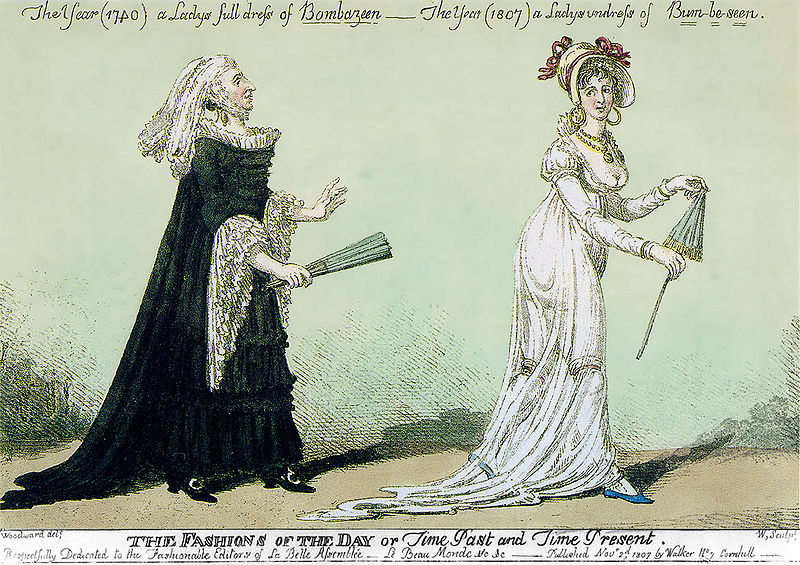by Historical Romanced Author Donna Hatch
www.donnahatch.com
 Fans have been used as both a fashion accessory and a useful tool of staying comfortable for hundreds of years. Nearly every culture has a fan of some sort and the Regency Era, the time period in which I base all my romance novels, is no exception.
Fans have been used as both a fashion accessory and a useful tool of staying comfortable for hundreds of years. Nearly every culture has a fan of some sort and the Regency Era, the time period in which I base all my romance novels, is no exception.
www.donnahatch.com
 Fans have been used as both a fashion accessory and a useful tool of staying comfortable for hundreds of years. Nearly every culture has a fan of some sort and the Regency Era, the time period in which I base all my romance novels, is no exception.
Fans have been used as both a fashion accessory and a useful tool of staying comfortable for hundreds of years. Nearly every culture has a fan of some sort and the Regency Era, the time period in which I base all my romance novels, is no exception.Unfortunately, the sources I read don't agree on what each action means. For example, according to one source,* to fan slowly means "I am married." But according to another** to fan slowly means, "Don't waste your time; I'm not interested."
Likewise, according to one***, fanning oneself quickly means "I am married." But yet another ****says the same action means" I love you so much."
Shrug.
Also, the modern reader might wonder why go to all the trouble of learning such an elaborate language? But I think it might work well for the very shy, the very tongue-tied, or the person who needs to get the message across but fears coming on too strong. Also, telling a man she's not interested in him might be easier to say in fan language than in speaking. How many times have you told a guy who asked you out that you were busy when you really wanted to tell him to buzz off?
So, unless I can make friends with Dr. Who and jump into his time machine to find out what, exactly, these gestures really meant during the Regency Era, we may never know. Still, here are a few hand signals on which my sources seem to agree:
Touching right cheek: yes
Touching left cheek: no
Touching left cheek: no
Touching finger to tip of fan: I wish to speak with you.
Running fingers through the fan's ribs: I want to talk to youResting the fan over the heart: my love for you is breaking my heart
Resting fan NEAR the heart: you have won my love
Resting fan on lips: I don't trust you.
Twirling in left hand: we are watched
Twirling in right hand: I love another
Open and shut: you are cruel
Twirling in right hand: I love another
Open and shut: you are cruel
Open wide: wait for me
Presented shut: do you love me?
With handle to lip: Kiss me
In right hand in front of face: Follow me
Drawing across the cheek: I love you
Placing on left ear: Leave me alone
Placing closed fan to the right eye: When may I see you?
Covering left ear with open fan: Do not betray our secret.Presented shut: do you love me?
With handle to lip: Kiss me
In right hand in front of face: Follow me
Drawing across the cheek: I love you
Placing on left ear: Leave me alone
Placing closed fan to the right eye: When may I see you?
So far, all the heroines in my Regency Romance novels have done with a fan is to keep cool or use it as a shield behind which they speak quietly to another. I admit, however I'm intrigued by the subtle, demure way a woman might have communicated to a man without speaking a word. She'd just have to time it when he's looking and not one else is, or her secret feelings would no longer be secret.
Sources:
*http://www.allhandfans.com/handfans/levels/language_of_the_fan.htm
**http://myhandfan.com/language.htm,
***Minute Company
****myhandfan.com
While I can't find an online version of the suggested article as referenced in Wikipedia, I'm posting the title and link to the journal referenced.
ReplyDeleteIt sounds like the so-called "language of fans" may have been more of an economic construct than a social one--which wouldn't surprise me.
FANA Journal, spring 2004, Fact & Fiction about the language of the fan by J.P. Ryan
http://www.fanassociation.org/projects.htm
http://en.wikipedia.org/wiki/Hand_fan
If I had to guess, without knowing anything more, I'd say it probably gained greatest currency in the Victorian era, along with the so-called "language of flowers."
There's also--referencing Georgette Heyer now--sometimes a debate over her period accuracy, but she was highly intensive with her research, and somehow I don't think she'd have let a subtext like that slip away--and you never see a Heyer girl "talking" with a fan.